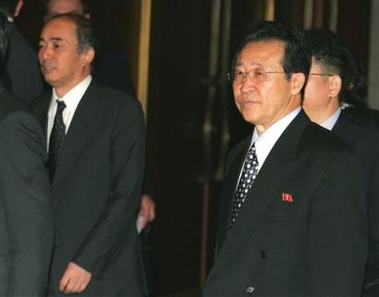|
China: Little progress on N. Korea talks
(AP)
Updated: 2005-11-09 01:00
Negotiators trying to persuade North Korea to give up its nuclear ambitions
focused Wednesday on the contentious details of how the North will disarm and
what it will get in exchange, with the U.S. and North Korean delegations holding
a separate meeting.

Japanese lead negotiator Kenichiro Sasae,
left, and North Korean envoy, Kim Gye Gwan, right, walk into a meeting
room at the opening session of the fifth round of six party talks in
Beijing's Diaoyutai State Guesthouse Wednesday Nov. 9, 2005.
[AP] |
Host China said little progress had been made by day's end in the new round
of six-nation talks.
Before the talks opened Wednesday morning at a Chinese government guesthouse,
Washington affirmed its refusal even to discuss the North's demand for a
civilian nuclear reactor until after Pyongyang disarms.
The last round of talks ended in September with North Korea's pledge to give
up nuclear development in exchange for aid and a security guarantee. But the
North raised doubts about its willingness to proceed by demanding a civilian
nuclear reactor before it disarms.
The U.S. envoy warned that Washington will not discuss giving the North a
reactor until it returns to the international Nuclear Nonproliferation Treaty
and accepts safeguards from the U.N.'s International Atomic Energy Agency.
"First they have got to disarm, create a nuclear-free Korean Peninsula, and
once they are back in the NPT with IAEA safeguards, at an appropriate time we'll
have a discussion about the subject of the provision of a light-water reactor,"
said Assistant Secretary of State Christopher Hill.
The Chinese delegate, Wu Dawei, whose government appealed in advance for
participants to be ready to make progress in the slow-moving talks, called on
negotiators to be flexible and pragmatic.
In his opening statement, he asked negotiators to "put forward proposals and
ideas so that we will be able to work out an implementation plan that is
acceptable to all sides at an early date."
By day's end, little progress had been made, said Chinese Foreign Ministry
spokesman Qin Gang.
"We still can see that various parties have a difference of views on how to
implement the joint statement and on the way it should be implemented," Qin said
at a briefing.
But, "all the six parties are working earnestly," he said.
|